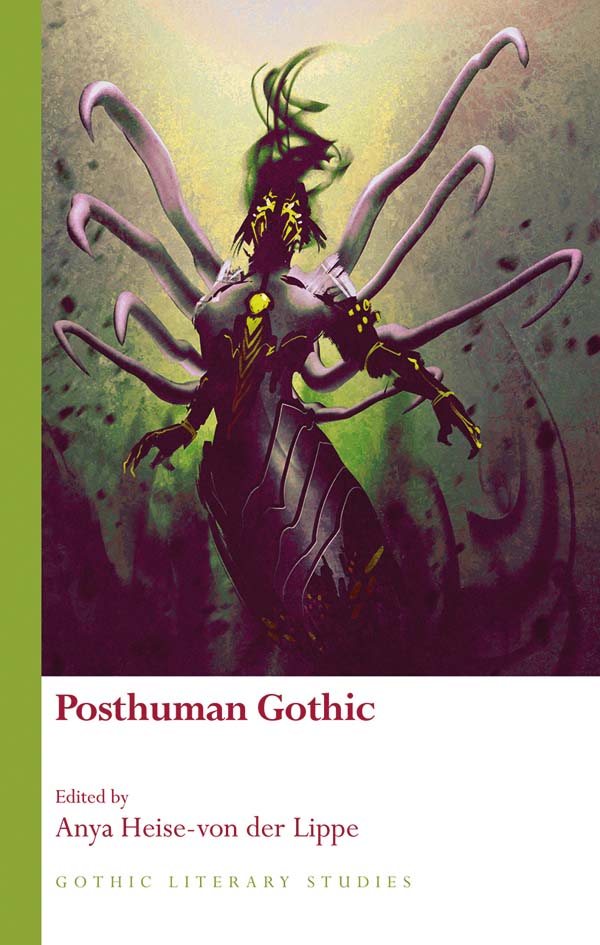Posthuman Gothic
Editor(s) Anya Heise-von der Lippe
Language: English
Genre(s): Literary Criticism, Media, Film and Theatre
Series: Gothic Literary Studies
- November 2017 · 272 pages ·216x138mm
- · Hardback - 9781786831064
- · eBook - pdf - 9781786831071
- · eBook - epub - 9781786831088
Posthuman Gothic is an edited collection of thirteen chapters, and offers a structured, dialogical contribution to the discussion of the posthuman Gothic. Contributors explore the various ways in which posthuman thought intersects with Gothic textuality and mediality. The texts and media under discussion – from I am Legend to In the Flesh, and from Star Trek to The Truman Show, transgress the boundaries of genre, moving beyond the traditional scope of the Gothic. These texts, the contributors argue, destabilise ideas of the human in a number of ways. By confronting humanity and its Others, they introduce new perspectives on what we traditionally perceive as human. Drawing on key texts of both Gothic and posthumanist theory, the contributors explore such varied themes as posthuman vampire and zombie narratives, genetically modified posthumans, the posthuman in video games, film and TV, the posthuman as a return to nature, the posthuman’s relation to classic monster narratives, and posthuman biohorror and theories of prometheanism and accelerationism. In its entirety, the volume offers a first attempt at addressing the various intersections of the posthuman and the Gothic in contemporary literature and media.
Acknowledgements Notes on Contributors
Introduction: Post/human/Gothic - Anya Heise-von der Lippe
Part I: Organic
1 Zombie Apocalypse and the Conundrum of Posthumanity in David Wong’s Novels - Michael Sean Bolton
2 Of Crakers and Men: Imagining the Future and Rethinking the Past in Margaret Atwood’s MaddAddam Trilogy - Antonia Perikou
3 Of Posthuman Vampires: Science, Blood and Becoming-With - Lars Schmeink
Part II: Undead
4 ‘Lovie – is the vampire so bad?’: Posthuman Rhetoric in Richard Matheson’s I am Legend - Chris Koenig-Woodyard
5 Coexistence and Hospitality: The Gothic Utopian Vision of True Blood - Erica McCrystal
6 Forging Posthuman Identities in Dominic Mitchell’s In The Flesh - Maria Alberto
7 More than Human: Reading the Doppelgänger and Female Monstrosity in Television Vampires - Maria Marino-Faza
Part III: Evolving
8 There’s Something in There: The Posthuman Gothic Mind/Body Divide in Jane Campion’s Top of the Lake - Amalya Ashman and Amy Taylor
9 Still Alive: Understanding Femininity in Valve’s Portal Games - Dawn Stobbart
10 Patchwork Girls: Reflections of Lost Female Identity in Louise O’Neill’s Only Ever Yours - Donna Mitchell
Part IV: Reimagined
11 Being Virtual: The True (Posthu)man Show - Dennis Yeo
12 The Posthuman Monstrous can only be Gothic, or Screening Alien Sex Fiends. - Evan Hayles Gledhill
13 Gothic Inhumanism: Prometheanism, Nanotechnology, Accelerationism - Apasia Stephanou
Bibliography Index
Author(s): Anya Heise-von der Lippe
Anya Heise-von der Lippe is Assistant Lecturer with the Chair of Anglophone Literatures at the Universität Tübingen.

